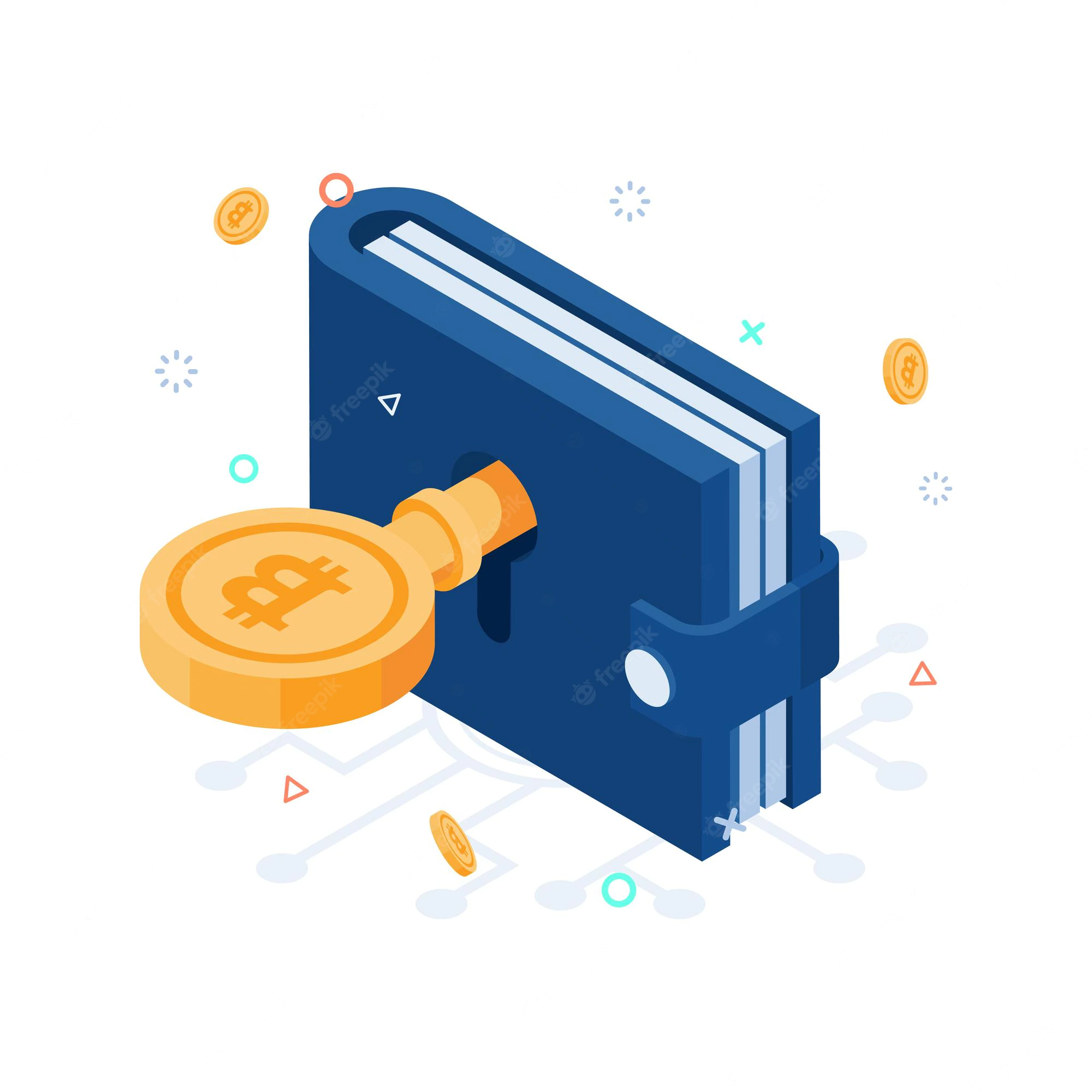
What is a crypto wallet?
Your private keys are kept safe and accessible by crypto wallets. You can send, receive, and spend cryptocurrencies like Bitcoin and Ethereum using them as well. Crypto wallets, which keep your private keys or passwords that grant access to your cryptocurrencies safe and easily accessible, allow you to send and receive cryptocurrencies such as Bitcoin and Ethereum. They are available in various formats, from mobile apps like Coinbase Wallet to hardware wallets like Ledger (which resembles a USB stick). They make buying cryptocurrency online as simple as using a credit card.
Why are crypto wallets important?
Crypto wallets technically don't store your cryptocurrency, unlike a regular wallet, which can contain actual cash. The blockchain is where your holdings are stored, but only a private key can access them. Your keys enable transactions while establishing your ownership of your digital currency. Your money is locked away if your private keys are lost. To avoid this, use a secure hardware wallet or a reputable provider of digital wallets, such as Coinbase.
How do you use a crypto wallet?
Simple-to-use apps and more sophisticated security solutions are both available as crypto wallets
The primary wallet categories include the following:
- Paper wallets: Keys are written on tangible material, such as paper, and kept securely. Naturally, this complicates your cryptocurrency since you can only use digital currency online.
- Hardware wallets: The keys are kept on a thumb drive in a secure location and only plugged into a computer when you want to use your cryptocurrency. The goal is to strike a balance between security and practicality.
- Online wallets: Look for one that uses two-step encryption and stores keys in an app or other piece of software. This makes sending, receiving, and using your cryptocurrency as simple as using an online bank account, payment method, or brokerage.
Every type has trade-offs. Paper and hardware wallets have limited functionality and risk being lost or destroyed, but they are more challenging for malicious users to access because they are stored offline. The simplest way to get started with cryptocurrency and provide a balance of security and accessibility are online wallets provided by a major exchange like Coinbase. Protecting against hackers depends on your wallet provider's security, so look for features like two-factor verification. This is because your private information is online. You can easily access your cryptocurrency holdings using an app like Coinbase Wallet or Exodus. You could:
- Manage all of your digital assets in a single, safe location.
- In charge of your private keys
- Anywhere in the world can send and receive cryptocurrency.
- Instead of using lengthy, hexadecimal "public key" addresses, use usernames.
- Look through the available applications (decentralized finance apps)
- Shop at establishments that take cryptocurrencies
Setting up a cryptocurrency wallet You can safely store your cryptocurrency in a crypto wallet. There are many cryptocurrency wallets, but hosted wallets, non-custodial wallets, and hardware wallets are the most widely used ones. Which one is best for you will depend on what you plan to do with your cryptocurrency and the level of security you require.
Hosted wallets
A hosted wallet is the most common and straightforward type of cryptocurrency wallet. Your cryptocurrency is always kept in a hosted wallet when you purchase it using a platform like Coinbase. The reason it's called host is that a third party stores your cryptocurrency for you, much like a bank does with the funds in a checking or savings account. Although you may have heard of people "losing their keys" or "losing their USB wallet," none of that is a concern when using a hosted wallet.
If you store your cryptocurrency in a hosted wallet, you won't lose it even if you forget your password. Unfortunately, you can't access all of the cryptocurrency's features with a hosted wallet, which is a disadvantage. However, this might alter as hosted wallets start to support more features. How to set up a hosted wallet:
- Pick a website that you can trust. Security, usability, and compliance with governmental and financial regulations ought to be your top priorities.
- Set up an account. Enter your information and pick a strong password. Utilizing 2-step verification, also known as 2FA, adds a layer of security and is advised.
Buy or transfer cryptocurrency. You can purchase cryptocurrency using a bank account or credit card on most cryptocurrency platforms and exchanges. You can move any cryptocurrency you own to your new hosted wallet to keep it secure.
Self-contained wallets
You have total control over your cryptocurrency with a self-custody wallet like the Coinbase Wallet. Non-custodial wallets don't entrust the security of your cryptocurrency to a third party, also known as a "custodian." While they provide the software required to store your crypto, it is your responsibility to remember and keep it secure. There is no way to access your crypto if you lose or forget your password, also known as a "private key" or "seed phrase." Additionally, if a third party finds your private key, they will have complete access to your assets
Why keep an unguarded wallet?
You can access more sophisticated crypto activities like yield farming, staking, lending, borrowing, and more, in addition to having complete control over the security of your cryptocurrency. A hosted wallet, however, is the most straightforward option if all you want to do is buy, sell, send, and receive cryptocurrency. How to set up a non-custodial wallet:
- Install a wallet app. Coinbase Wallet is one of the well-liked choices
- Set up an account. Unlike a hosted wallet, you can create a non-custodial wallet without divulging personal information. Not even a working email.
- Make sure to record your private key on paper. It appears as a 12-word sentence chosen at random. Please keep it in a safe place. You won't be able to access your cryptocurrency if you misplace it or forget this 12-word phrase.
Customers of Coinbase can choose between a hosted wallet and a self-custody wallet. A hosted wallet is the Coinbase app, where you can buy and sell cryptocurrency. To benefit from a non-custodial wallet, you can also download the standalone Coinbase Wallet app. Some of our customers have both, making it simple to purchase cryptocurrency using conventional currency and participate in sophisticated crypto activities. In addition, it costs nothing to set up either wallet
Hardware wallets
The private keys to your cryptocurrency are kept offline on a physical device called a hardware wallet that is roughly the size of a thumb drive. Due to their increased complexity and cost, most people don't use hardware wallets. Still, they have some advantages, such as keeping your cryptocurrency secure even if your computer is hacked. However, they can cost upwards of $100, and their advanced security makes them less convenient to use than a software wallet. Creating a hardware wallet:
- Buy the equipment. The two most recognizable brands are Trezor and Ledger.
- Install the application. Software specific to each brand is required to configure your wallet. Download the official company website software to create your wallet and follow the on-screen directions.
- Add cryptocurrency to your wallet. Like a non-custodial wallet, a hardware wallet typically prevents you from purchasing cryptocurrency using fiat money (such as US dollars or euros), so you must transfer cryptocurrency to your wallet instead.
Cryptocurrency can be kept in various locations, much like cash (which can be kept in a bank account, a safe, or even under the bed). With cryptocurrency, you have a variety of options for your wallets. For example, you can keep things simple with a hosted wallet, have complete control over your cryptocurrency with a non-custodial wallet, take additional security measures with a hardware wallet, or even have multiple types of wallets.



